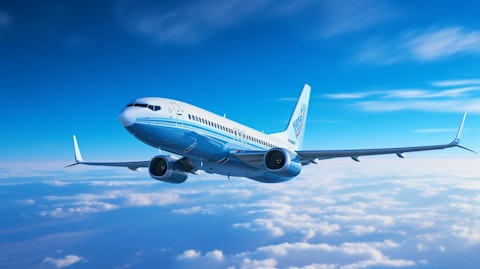We recently compiled a list of the 12 Best Aviation Stocks to Buy According to Hedge Funds. In this article, we are going to take a look at where SkyWest Inc. (NASDAQ:SKYW) stands against the other best aviation stocks.
Aviation stocks are the shares of firms in the aviation industry, such as airlines, aircraft manufacturers, and airport operators.
The global lockdowns triggered by the pandemic caused significant disruptions to the travel industry. According to the International Air Transport Association (IATA), air travel worldwide decreased by 60% in 2020 as a result of the significant disruptions caused by the COVID-19 pandemic. There were only 1.8 billion passengers flying through 2020, down from almost 4.5 billion in 2019, according to the International Civil Aviation Organization (ICAO), while seating capacity dropped by about 50% in 2020.
Despite these challenges, the airline industry has regained stability as lockdowns have lifted and normalcy has returned. Verified Market Size estimated that the global airline market will increase at a compound annual growth rate (CAGR) of 3.21% from 2024 to 2031, from a 2023 valuation of $569.02 billion to $732.66 billion. The industry is mostly driven by the development of fuel-efficient aircraft and the use of sustainable aviation fuel (SAF). The Federal Aviation Administration (FAA) of the United States claims that the implementation of SAF could cut aviation emissions by as much as 80%, supporting the industry’s sustainability objectives and reducing operating expenses.
Currently, airlines are facing record demand. According to AAA, nearly 80 million people were anticipated to travel by road and air this Thanksgiving, with the number of travelers exceeding pre-pandemic levels. Seat occupancy on airplanes has increased from 74% in 2003 to 84% in the first ten months of this year. The seat occupancy rate jumped from 69% in 2004 to 79% this year, even during slower months like January. According to the Consumer Price Index, airfares rose by more than 10% between July and October as a result of the limited availability. Reduced competition and flight cuts by budget carriers, such as a 10% holiday reduction, have further reduced availability, raising prices and reducing the number of reasonably priced options.
U.S. Airlines and Aircraft Leasing Analyst Jamie Baker of J.P. Morgan claims,
“Our prevailing thesis is that demand for premium and international air travel continues to lead the market.”
The International Air Transport Association (IATA) forecasts that airlines will transport about 5 billion passengers by 2024. According to IATA’s 2024 forecasting, airlines should report net earnings of $30.5 billion this year, up from $25.7 billion in December. It was estimated that the industry’s overall revenues would increase by over 10% to a record $996 billion. The projected profit “is a great achievement considering the recent deep pandemic losses,” IATA Director General Willie Walsh said while addressing the annual general assembly of the trade association in Dubai. According to IATA, which has more than 300 members and accounts for 83% of all air traffic globally, North American airlines are expected to generate about half of all profits in 2024, with a projected surplus of $14.8 billion, while European airlines are expected to see an increase in profits of between $8.6 billion and $9 billion.
According to the International Air Transport Association (IATA), industry revenues will exceed $1.007 trillion, a 4.4% rise from 2024, and cross $1 trillion for the first time in 2025. It is projected that the number of passengers will reach 5.2 billion, which would be another significant milestone in the industry’s post-pandemic recovery.
Willie Walsh, IATA’s Director General stated:
“Looking at 2025, for the first time, traveler numbers will exceed five billion and the number of flights will reach 40 million. This growth means that aviation connectivity will be creating and supporting jobs across the global economy. The most obvious are the hospitality and retail sectors which will gear up to meet the needs of a growing number of customers. But almost every business benefits from the connectivity that air transport provides, making it easier to meet customers, receive supplies, or transport products. On top of this, growth in aviation also contributes to achieving almost all the UN’s Sustainable Development Goals (SDGs),”

A modern commercial jet airliner decorated with the company logo in flight against a clear blue sky.
Methodology
We sifted through holdings of Airline ETFs and online rankings to form an initial list of 20 Aviation stocks. From the resultant dataset, we chose 12 stocks with the highest number of hedge fund investors, using Insider Monkey’s database of 900 hedge funds in Q3 2024 to gauge hedge fund sentiment for stocks. We have used the stock’s Revenue Growth Rate (year-over-year) as a tie-breaker in case two or more stocks have the same number of hedge funds invested.
Why are we interested in the stocks that hedge funds pile into? The reason is simple: our research has shown that we can outperform the market by imitating the top stock picks of the best hedge funds. Our quarterly newsletter’s strategy selects 14 small-cap and large-cap stocks every quarter and has returned 275% since May 2014, beating its benchmark by 150 percentage points. (see more details here)
SkyWest Inc. (NASDAQ:SKYW)
Number of Hedge Fund Investors: 27
SkyWest, Inc. (NASDAQ:SKYW) provides commercial flight services in the United States, Canada, Mexico, and the Caribbean. In order to contribute to revenue generation, it also rents aircraft to qualified users. The airline company generally offers regional flights and transports customers who purchased tickets through airlines using its smaller, less expensive aircraft. It collaborates with airlines throughout the world to fly and operate planes for a fee. The two reportable segments of the company are SkyWest Leasing and SkyWest Airlines.
SkyWest, Inc. (NASDAQ:SKYW)’s revenue grew 19% YoY to $913 million in the third quarter of 2024, fueled by a 15% increase in block hour production due to improved captain accessibility and the recognition of $19 million in previously deferred revenue under flying contracts. Net income increased from $23 million in Q3 2023 to $90 million in this quarter. The operating cash flow increased by 2.64% YoY.
TD Cowen maintained a Buy rating on SkyWest, Inc. (NASDAQ:SKYW) shares and increased their price target from $95 to $120 on November 5, 2024. According to the firm, management increased guidance for FY24 EPS and anticipates FY25 EPS to surpass previous consensus projections, and they produced yet another set of remarkable results.
Stephen White’s SW Investment Management was the largest stakeholder in the company among the funds in Insider Monkey’s database. It owns 775,000 shares worth $65.89 million as of Q3.
ClearBridge Small Cap Value Strategy stated the following regarding SkyWest, Inc. (NASDAQ:SKYW) in its Q2 2024 investor letter:
“We also added a new position in SkyWest, Inc. (NASDAQ:SKYW), a regional airline operator. The company reported strong quarterly earnings as its pilot attrition declines and fleet utilization improves. We believe that SkyWest continues to find opportunities to deploy capital in a value-accretive manner, acquiring more planes under long-term contracts. We think earnings should hold up in a potential recession and perhaps even improve further if major airlines reduce capacity and more pilots become available for SkyWest.”
Overall, SKYW ranks 8th on our list of the best aviation stocks according to hedge funds. While we acknowledge the potential of SKYW as an investment, our conviction lies in the belief that some AI stocks hold greater promise for delivering higher returns and doing so within a shorter time frame. If you are looking for an AI stock that is more promising than SKYW but that trades at less than 5 times its earnings, check out our report about the cheapest AI stock.
READ NEXT: 8 Best Wide Moat Stocks to Buy Now and 30 Most Important AI Stocks According to BlackRock.
Disclosure: None. This article is originally published at Insider Monkey.





